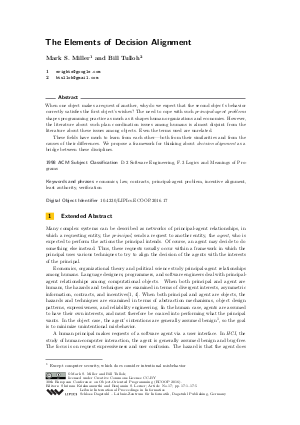The Elements of Decision Alignment
Authors Mark S. Miller, Bill Tulloh
-
Part of:
Volume:
30th European Conference on Object-Oriented Programming (ECOOP 2016)
Part of: Series: Leibniz International Proceedings in Informatics (LIPIcs)
Part of: Conference: European Conference on Object-Oriented Programming (ECOOP) - License:
 Creative Commons Attribution 3.0 Unported license
Creative Commons Attribution 3.0 Unported license
- Publication Date: 2016-07-18
File

PDF
LIPIcs.ECOOP.2016.17.pdf
- Filesize: 412 kB
- 5 pages
Document Identifiers
Subject Classification
Keywords
- economics
- law
- contracts
- principal-agent problem
- incentive alignment
- least authority
- verification
Metrics
- Access Statistics
-
Total Accesses (updated on a weekly basis)
0Document
0Metadata
Abstract
When one object makes a request of another, why do we expect that the second object's behavior correctly satisfies the first object's wishes? The need to cope with such principal-agent problems shapes programming practice as much as it shapes human organizations and economies. However, the literature about such plan coordination issues among humans is almost disjoint from the literature about these issues among objects. Even the terms used are unrelated. These fields have much to learn from each other---both from their similarities and from the causes of their differences. We propose a framework for thinking about decision alignment as a bridge between these disciplines.
Cite As Get BibTex
Mark S. Miller and Bill Tulloh. The Elements of Decision Alignment. In 30th European Conference on Object-Oriented Programming (ECOOP 2016). Leibniz International Proceedings in Informatics (LIPIcs), Volume 56, pp. 17:1-17:5, Schloss Dagstuhl – Leibniz-Zentrum für Informatik (2016)
https://doi.org/10.4230/LIPIcs.ECOOP.2016.17
BibTex
@InProceedings{miller_et_al:LIPIcs.ECOOP.2016.17,
author = {Miller, Mark S. and Tulloh, Bill},
title = {{The Elements of Decision Alignment}},
booktitle = {30th European Conference on Object-Oriented Programming (ECOOP 2016)},
pages = {17:1--17:5},
series = {Leibniz International Proceedings in Informatics (LIPIcs)},
ISBN = {978-3-95977-014-9},
ISSN = {1868-8969},
year = {2016},
volume = {56},
editor = {Krishnamurthi, Shriram and Lerner, Benjamin S.},
publisher = {Schloss Dagstuhl -- Leibniz-Zentrum f{\"u}r Informatik},
address = {Dagstuhl, Germany},
URL = {https://drops.dagstuhl.de/entities/document/10.4230/LIPIcs.ECOOP.2016.17},
URN = {urn:nbn:de:0030-drops-61111},
doi = {10.4230/LIPIcs.ECOOP.2016.17},
annote = {Keywords: economics, law, contracts, principal-agent problem, incentive alignment, least authority, verification}
}
Author Details
References
- Kathleen M. Eisenhardt. Agency theory: An assessment and review. The Academy of Management Review, 14(1):57-74, 1989. URL: http://www.jstor.org/stable/258191.
-
Friedrich A. Hayek. The use of knowledge in society. The American economic review, pages 519-530, 1945.

-
Friedrich A. Hayek. Competition as a discovery procedure. New Studies in Philosophy, Politics, Economics and the History of Ideas, 1978.

-
Laffont Jean-Jacques and David Martimort. The theory of incentives. the principal-agent model. Princeton, NJ: Princeton Univ, 2001.

-
Ludwig M. Lachmann. Capital and its Structure. Ludwig von Mises Institute, 1956.

-
Mark Samuel Miller. Robust Composition: Towards a Unified Approach to Access Control and Concurrency Control. PhD thesis, Johns Hopkins University, Baltimore, Maryland, USA, May 2006.

-
Toby S. Murray, Daniel Matichuk, Matthew Brassil, Peter Gammie, Timothy Bourke, Sean Seefried, Carmen Lewis, Xin Gao, and Gary Klein. sel4: from general purpose to a proof of information flow enforcement. In Security and Privacy (SP), 2013 IEEE Symposium on, pages 415-429. IEEE, 2013.

-
David L. Parnas. On the criteria to be used in decomposing systems into modules. Communications of the ACM, 15(12):1053-1058, 1972.

-
Jerome H. Saltzer and Michael D. Schroeder. The protection of information in computer systems. Proceedings of the IEEE, 63(9):1278-1308, 1975.

-
Bill Tulloh and Mark S. Miller. Institutions as abstraction boundaries. Social Learning: Essays in Honor of Don Lavoie, 2002.

